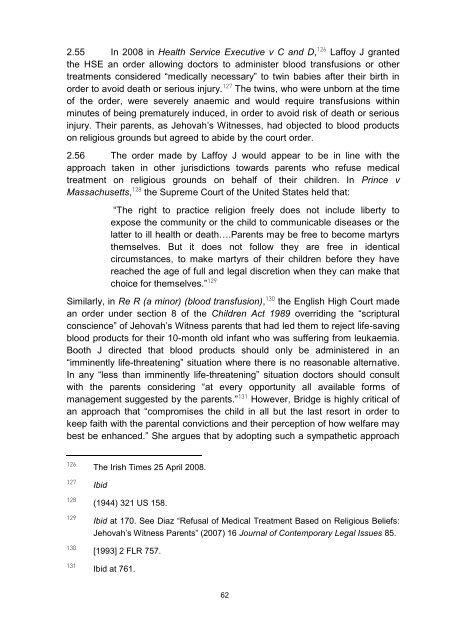Consultation Paper on Bioethics - Law Reform Commission
Consultation Paper on Bioethics - Law Reform Commission
Consultation Paper on Bioethics - Law Reform Commission
Create successful ePaper yourself
Turn your PDF publications into a flip-book with our unique Google optimized e-Paper software.
2.55 In 2008 in Health Service Executive v C and D, 126 Laffoy J granted<br />
the HSE an order allowing doctors to administer blood transfusi<strong>on</strong>s or other<br />
treatments c<strong>on</strong>sidered “medically necessary” to twin babies after their birth in<br />
order to avoid death or serious injury. 127 The twins, who were unborn at the time<br />
of the order, were severely anaemic and would require transfusi<strong>on</strong>s within<br />
minutes of being prematurely induced, in order to avoid risk of death or serious<br />
injury. Their parents, as Jehovah‟s Witnesses, had objected to blood products<br />
<strong>on</strong> religious grounds but agreed to abide by the court order.<br />
2.56 The order made by Laffoy J would appear to be in line with the<br />
approach taken in other jurisdicti<strong>on</strong>s towards parents who refuse medical<br />
treatment <strong>on</strong> religious grounds <strong>on</strong> behalf of their children. In Prince v<br />
Massachusetts, 128 the Supreme Court of the United States held that:<br />
“The right to practice religi<strong>on</strong> freely does not include liberty to<br />
expose the community or the child to communicable diseases or the<br />
latter to ill health or death….Parents may be free to become martyrs<br />
themselves. But it does not follow they are free in identical<br />
circumstances, to make martyrs of their children before they have<br />
reached the age of full and legal discreti<strong>on</strong> when they can make that<br />
choice for themselves.” 129<br />
Similarly, in Re R (a minor) (blood transfusi<strong>on</strong>), 130 the English High Court made<br />
an order under secti<strong>on</strong> 8 of the Children Act 1989 overriding the “scriptural<br />
c<strong>on</strong>science” of Jehovah‟s Witness parents that had led them to reject life-saving<br />
blood products for their 10-m<strong>on</strong>th old infant who was suffering from leukaemia.<br />
Booth J directed that blood products should <strong>on</strong>ly be administered in an<br />
“imminently life-threatening” situati<strong>on</strong> where there is no reas<strong>on</strong>able alternative.<br />
In any “less than imminently life-threatening” situati<strong>on</strong> doctors should c<strong>on</strong>sult<br />
with the parents c<strong>on</strong>sidering “at every opportunity all available forms of<br />
management suggested by the parents.” 131 However, Bridge is highly critical of<br />
an approach that “compromises the child in all but the last resort in order to<br />
keep faith with the parental c<strong>on</strong>victi<strong>on</strong>s and their percepti<strong>on</strong> of how welfare may<br />
best be enhanced.” She argues that by adopting such a sympathetic approach<br />
126 The Irish Times 25 April 2008.<br />
127 Ibid<br />
128 (1944) 321 US 158.<br />
129 Ibid at 170. See Diaz “Refusal of Medical Treatment Based <strong>on</strong> Religious Beliefs:<br />
Jehovah‟s Witness Parents” (2007) 16 Journal of C<strong>on</strong>temporary Legal Issues 85.<br />
130 [1993] 2 FLR 757.<br />
131 Ibid at 761.<br />
62

















